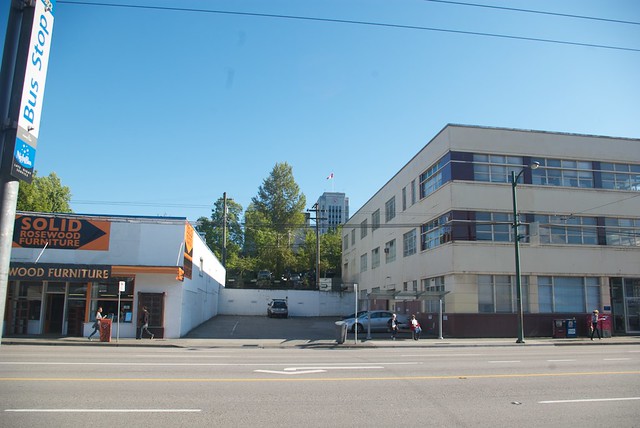Main Street has become a frontier for high-end real-estate development.
Whether at Little Mountain, 33rd Avenue, King Edward, 16th Avenue, Broadway, South East False Creek or the Downtown Eastside, the entire Main Street corridor has been re-imagined as the new horizon for redevelopment and increased rent extraction. Right in the center of Vancouver’s working class heart, a precedent setting new luxury condo is in its rezoning application phase, and has incited a battle between a large majority of concerned residents and an individual but well-heeled real-estate developer.
This past Tuesday Jan 16 2012, the City of Vancouver and the Rize Alliance presented an updated plan for the controversial redevelopment of Broadway and Kingsway. There are few changes to the plan since March of last year when at a consultation 90% of the community spoke out against it. The fact that now, post-election, the planning department is asserting its position against the wishes of the community and in favour of the developer is a sign that the political battle, the Public Hearing at City Hall, is just around the corner.
Rize Alliance
Rize’s current proposal consists of a nineteen storey tower with 241 units of market condos, one 85,000 sq. ft. retail space, and an underground parking garage of 320 spaces. On Tuesday, two major changes were announced: scrapping a proposed 9,200 sq. ft. artist-studio space, for a cash contribution to fund an off-site cultural or civic facility, and the removal of 15 market rental STIR units — the same program that the Vision Vancouver has consistently defended as a successful policy to build affordable housing. During the election campaign, Vision differentiated itself from the NPA by pointing to the STIR policy, and even called on voters to vote for Vision in order to defend STIR.
If the other project developed by Rize in Mount Pleasant and the current marketing material is any indication, the new condos will not be affordable to long-time residents living in the neighbourhood. New units in Rize’s OnQue, on the corner of Broadway and Quebec start at $349,000 for a 640 sq. ft. one bedroom. According to the most recent census figures, the average income in Mt. Pleasant is approximately $10,000 below the city’s average, or $37,000 a year.
On top of that, the 85,000 sq. ft. retail space is set to be filled with a new big box store that will place even more pressure on already struggling small businesses in the neighborhood and residents who cannot afford to pay for over-priced fruits and vegetables. Already businesses along Main are feeling pressure. Some are organizing fundraisers, some are moving east, and others are having their keys taken by the bailiff.
This Rize project and pressures faced on Mount Pleasant is a textbook example of gentrification, the result of which is and will be the continued displacement of the largely low-income community who call the neighborhood their home. This is part of the reason why the redevelopment of this particular site is drawing attention from both the neighbourhood itself and from the development community. If this project does go through despite significant opposition, it will set a major precedent for other large-scale projects throughout East Vancouver.





